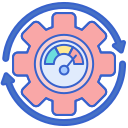Boosting Efficiency with Artificial Intelligence in Corporate Workflows
Modern organizations are constantly seeking innovative solutions to enhance productivity and streamline operations. Artificial intelligence (AI) has emerged as a transformative force in redefining how businesses handle their workflows. By integrating advanced AI technologies, companies are experiencing accelerated decision-making, reduced manual effort, and improved efficiency across various departments. This page explores how AI empowers corporate workflows, drives smarter resource allocation, and sets the stage for a more agile business landscape.

Manual data entry is often slow, error-prone, and time-consuming. AI-driven solutions, such as optical character recognition and natural language processing, can automatically extract relevant information from documents, emails, and forms. These tools reduce the burden on employees and minimize mistakes, allowing teams to focus on higher-value tasks. By eliminating repetitive manual work, companies not only save time but also maintain cleaner, more accurate records that facilitate better business insights and compliance.


Predictive Analytics for Forecasting
Predictive analytics uses AI algorithms to process historical and real-time data, unveiling patterns and trends that humans might overlook. With these insights, organizations can anticipate market shifts, customer behaviors, and operational bottlenecks. AI models refine their accuracy over time, ensuring that forecasts are continually updated and relevant. This empowers leaders to make proactive decisions, allocate resources wisely, and mitigate risks long before they turn into substantial challenges.
Real-Time Monitoring and Alerts
Timeliness is crucial when responding to market changes or internal issues. AI-driven monitoring systems scan corporate workflows for anomalies, performance lags, and compliance breaches, triggering instant alerts for decision-makers. These tools dramatically shorten response times, helping organizations deal with problems before they escalate. Real-time feedback ensures that managers are never in the dark about mission-critical developments, supporting agile pivots and operational resilience.
Personalized Recommendations
Every organization faces unique strategic challenges that require tailored solutions. AI systems can analyze vast amounts of contextual data to generate personalized recommendations for specific business scenarios, such as optimizing supply chains or improving customer engagement. By taking into account both internal and external variables, AI provides actionable suggestions that go beyond generic best practices. This level of customization boosts organizational effectiveness, positioning companies to address their needs with greater precision.
Intelligent Process Automation
Business process automation has been revolutionized by AI, which can now manage workflows previously thought to require human judgment. Systems employing machine learning and robotic process automation can handle invoice processing, employee onboarding, and compliance checks with minimal oversight. These intelligent solutions reduce processing times, eliminate bottlenecks, and adapt to evolving business rules, allowing companies to scale operations without significantly increasing headcount.
Enhanced Scheduling and Resource Allocation
Effective use of resources is a constant challenge for organizations of all sizes. AI-powered scheduling systems analyze historical data, employee preferences, and project requirements to generate optimal work schedules and resource allocations. By considering a wider range of variables than traditional methods, these technologies minimize manual intervention, improve utilization rates, and reduce conflicts or inefficiencies. This leads to smoother operations and a more balanced workload for employees.
Automated Communication Management
Internal and external communications are integral to corporate workflows. AI chatbots and virtual assistants can manage routine inquiries, schedule meetings, and provide standardized responses to frequently asked questions. These tools free up time for professionals to focus on higher-value tasks while ensuring that stakeholders receive timely, consistent information. Automating communication processes reduces bottlenecks and ensures smooth collaboration across teams and departments.
Previous slide
Next slide

